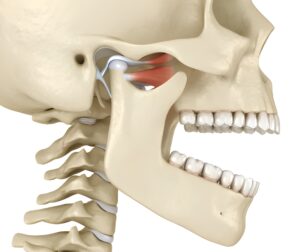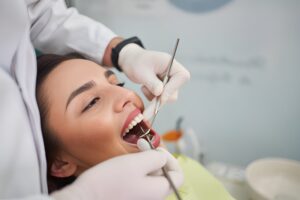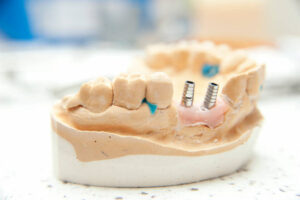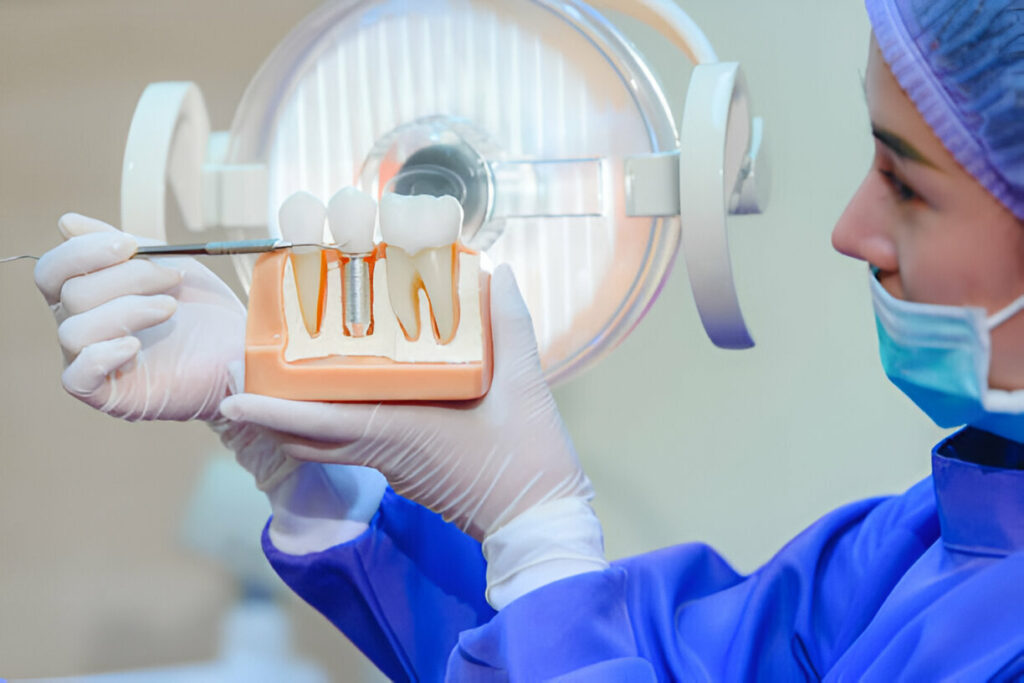Summary:
Did you recently undergo a dental implant treatment?
If yes, then congratulations on undergoing the smile-changing procedure. It’s a significant step towards reclaiming your beautiful, functional smile.
But did you know that your newly enhanced smile can get dull again?
Your dental implant can lose its luster and impact oral aesthetics when not adequately cared for. Therefore, it’s essential to care for your appliance and ensure proper aftercare following the treatment.
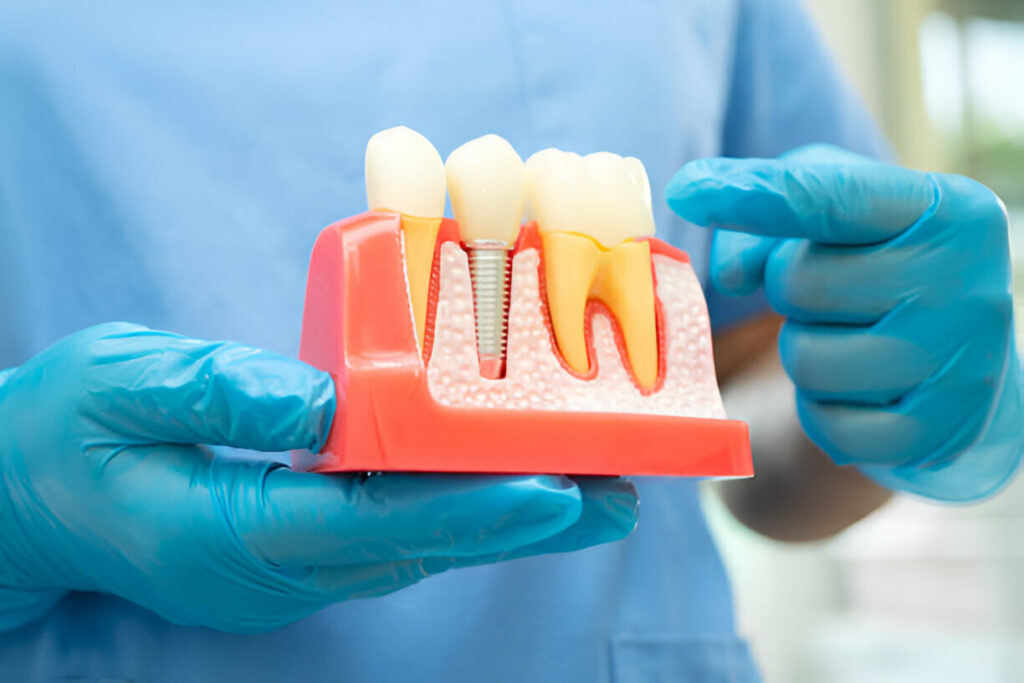
Keeping the same in mind, this blog takes a closer look at topics like:
- Why Implants Aftercare Is Important?
- Immediate Aftercare Post Implant Surgery
- What Promotes Faster Healing Among Implants?
- Tips for Long-term Success of Dental Implants
- How Long Does It Take For Implants to Recover Fully?
Continue reading as we learn more about the procedure in the following sections.
Why Implants Aftercare Is Important?
Your dental implants’ success depends on a mix of meticulous aftercare and long-term maintenance. They have the best success rate (90-95%) of any dental operation. However, part of that success is your regular home care regimen.
Following your home-care instructions can aid in smooth recovery, promote speedier healing, and let you reap the advantages of your implants for years to come.
Keeping this in mind, we will examine the different aftercare tips for different phases of the surgery. In the following sections, we will learn more about them.
Immediate Aftercare Post Implant Surgery
The first hours after your operation are critical. Carefully follow the dentist’s advice to enhance recovery and avoid problems. To avoid irritation and bleeding, do not rinse, spit, or poke the incision on the day of the operation. Elevating your head and applying an ice pack might assist in relieving swelling and discomfort.
Your oral surgeon will also give particular advice for your situation, ensuring that the healing process proceeds as smoothly as possible. Adherence to these measures, such as taking prescribed medications and regulating food, is critical.
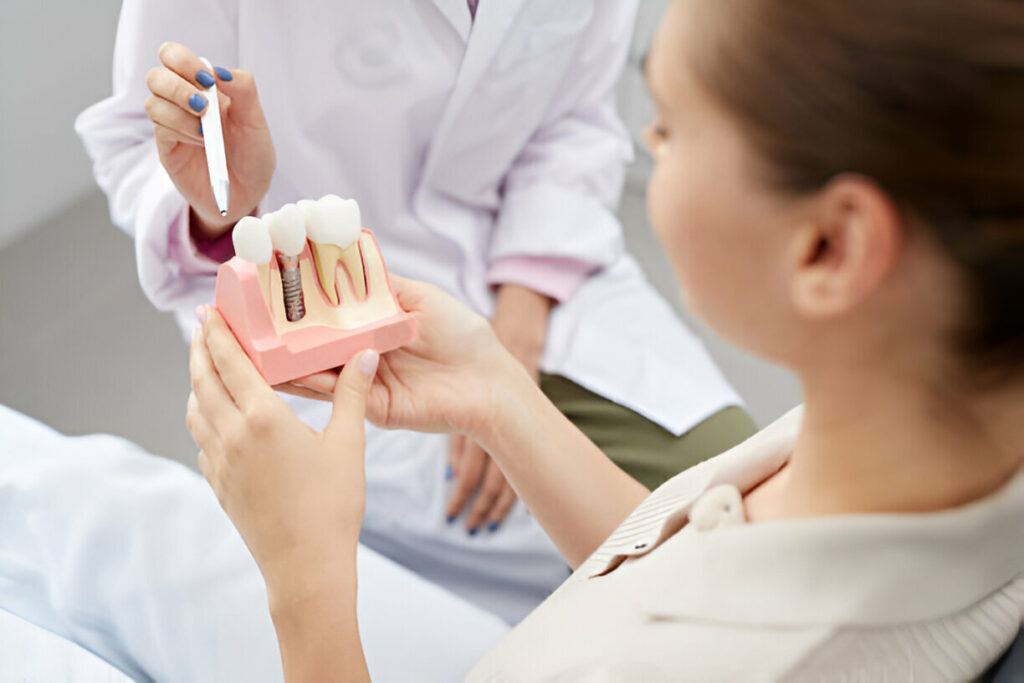
The first 48 hours after surgery are often the most difficult, with particular emphasis on controlling pain and edema. During this time, it is critical to take gentle care of your mouth, avoid vigorous activities, and keep a clean surgery site.
Remember that everyone’s route to recovery is unique. Please call our Peabody dentist if you have any questions or concerns regarding your recovery process. Their skilled assistance will provide the necessary support, ensuring a successful and seamless journey to restoring your smile with dental implants in Killeen, TX.
What Promotes Faster Healing Among Implants?
Proper healing will substantially impact the outcome of your dental implant procedure. Here are some essential guidelines to remember following your implant surgery:
1. Follow Post-Operative Instructions:
Your dentist in killeen tx will offer guidelines particular to your operation. These may include drugs you must take, how to clean the surgery site, and food restrictions while your mouth heals. Adherence to these rules is essential for avoiding difficulties.
2. Oral Hygiene:
Maintaining good oral hygiene is critical to long-term implant success. Brush your teeth twice every day with a soft-bristled toothbrush. Avoid the surgery region for several days and gradually introduce mild brushing. Once your implant site has healed completely, you should brush and floss around each implant daily.
3. Rinsing:
Rinsing your mouth with warm saltwater can help minimize inflammation and infection following implant surgery. As you recuperate, swirl gently and avoid using strong mouth rinses containing alcohol.
4. Avoid Smoking and Alcohol:
Both smoking and drinking can slow the healing process and raise the chance of complications. Your dentist may even urge you to forgo coffee or fizzy beverages temporarily.
5. Stay Hydrated and Rest:
Drinking plenty of water helps the healing process. Also, make sure you receive adequate rest so your body can heal. Most patients prefer to sleep in a chair for a few days because having their head elevated reduces edema.
Tips for Long-term Success of Dental Implants
The long-term success of your implants can be categorized into:
1. Brushing:
Enjoy the twice-daily brushing routine, but with a mild twist. Use a soft-bristle toothbrush and learn the art of circular motion. This technique protects not just the fragile gum tissue but also the integrity of your implant crowns.
2. Flossing:
Flossing is equally vital as brushing, especially after dental implant surgery. Clean the space between the implant and the teeth next to it using dental floss or a gentle brush. This eliminates plaque and food particles, which can contribute to gum disease.
3. Antimicrobial Mouthwash:
Consider using an antibacterial mouthwash that your dentist has carefully prescribed to prevent the risk of infection around the implant site. This precision-targeted technique eliminates any possible dangers to your implant’s stability, ensuring long-term success and peace of mind.

4. Regular Dental Checkups:
Schedule routine dental examinations and cleanings with your periodontist or dentist. They can keep track of the health of your dental implants and do expert cleanings that reach areas you might overlook throughout your everyday routine.
5. Avoid Tobacco:
Smoking or consuming tobacco products in any manner increases the likelihood of implant failure. If you smoke, consider stopping to ensure the success of your dental implants.
Dietary Considerations for Dental Implants
Your diet plays a significant role in your implant’s overall health. Proper nutrition can help build strong bone and gum tissue, which are required for implant stability.
Here are the dietary concerns for dental implants:
1. Balanced Diet:
To promote bone health, eat a well-balanced diet rich in vitamins and minerals, particularly calcium and vitamin D. Dairy products, leafy greens, and fortified meals are excellent suppliers of these nutrients.
2. Limit Sugar and Acidic Foods:
Avoid sugary and acidic meals and beverages. They can lead to tooth decay and gum disease, potentially shortening the life of your dental implants.
3. Avoid Chewing on Hard Objects:
Avoid biting on hard items like ice, pencils, or pens since this might put too much pressure on your dental implants and cause damage.
4. Stay Hydrated:
Drink enough water to ensure optimum oral hydration and general wellness. Proper hydration provides a cascade of benefits for your dental health that are not restricted to the implants.
How Long Does It Take For Implants to Recover Fully?
The recovery period varies from person to person! It is determined by factors such as pre-existing medical issues, the intricacy of the treatment, and your body’s reaction to the implant. The initial healing phase might last 2-3 weeks, during which you may have swelling and slight pain.
However, total osseointegration, the process by which the bone attaches to your implants, usually takes many months. Dentists track your progress and walk you through each stage of recovery. Osseointegration is not unpleasant; however, it takes time for your implant to sustain a permanent repair.
Takeaway
- Dental implants have a high success rate. However, their success depends on a mix of meticulous aftercare and long-term maintenance.
- The first 48 hours after surgery are often the most difficult, with particular emphasis on controlling pain and edema.
- Your diet plays a significant role in your implant’s overall health. Proper nutrition can help build strong bone and gum tissue.
- Are you still worried about the aftercare possibilities for your implants? Let our experts at Killeen Dental Group help you navigate them!

